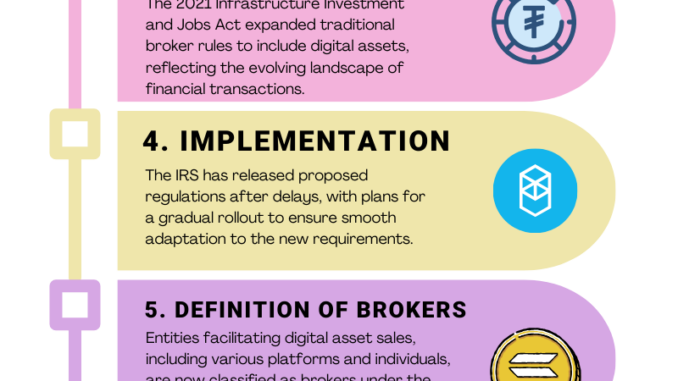
The US Treasury has revealed new regulations requiring crypto custodial brokers to report their users’ transactions to the Internal Revenue Service (IRS).
Starting in 2026, these brokers must report gross proceeds on digital asset sales from 2025. They must also report tax-related information on certain digital assets in 2027 for the previous year.
IRS Unveils Final Draft of Crypto Rules
The new regulations target custodial digital asset trading platform operators, hosted wallet providers, digital asset kiosks, and specific digital asset payment processors (PDAPs). The IRS said these brokers cover the majority of digital asset transactions and capture a large number of taxpayers.
Brokers must disclose movements and gains of customer assets, including stablecoins like USDT and high-value NFTs. They must also report the fair market value of tokenized real-world assets in real estate transactions. This regulation provides crypto investors with a simple 1099 form, similar to that of banks and brokers.
Read more: How to Reduce Your Crypto Tax Liability: A Comprehensive Guide
This move is a significant step forward in crypto taxation to curb tax evasion. IRS Commissioner Danny Werfel emphasized that these regulations are crucial for improving tax compliance among high-income individuals. He furthered that the rules would arm taxpayers with the necessary information to simplify their tax reporting process.
“We need to make sure digital assets are not used to hide taxable income, and these final regulations will improve detection of noncompliance in the high-risk space of digital assets. Our research and experience demonstrate that third-party reporting improves compliance. In addition, these regulations will provide taxpayers with much needed information, which will reduce burden and simplify the process of reporting their digital asset activity,” Werfel stated.
Meanwhile, decentralized exchanges and self-custody wallets are not subject to the new reporting rules. Instead, the IRS said it was still reviewing industry comments and needed more time to study the decentralized networks.
“The final regulations do not include reporting requirements for brokers that do not take possession of the digital assets being sold or exchanged. These brokers are commonly called decentralized or non-custodial brokers. The US Treasury Department and the IRS intend to provide rules for these brokers in a different set of final regulations,” the IRS explained.
Read more: The Ultimate US Crypto Tax Guide for 2024
Industry advocacy groups like The Blockchain Association have welcomed the IRS’s decision to study DeFi further. The group’s Head of Legal, Marisa Tashman Coppell, said the regulator’s move showed that the industry’s collective voice continues to positively impact Washington.
Similarly, Jake Chervinsky, a well-known crypto lawyer, described this move as “an unexpected but huge policy win for DeFi.”
“The proposed rule implementing the infrastructure bill’s tax provisions would have required non-custodial DeFi front-ends to KYC users. Treasury just finalized the rule but only for custodians, leaving DeFi for another day,” he remarked.
Disclaimer
In adherence to the Trust Project guidelines, BeInCrypto is committed to unbiased, transparent reporting. This news article aims to provide accurate, timely information. However, readers are advised to verify facts independently and consult with a professional before making any decisions based on this content. Please note that our Terms and Conditions, Privacy Policy, and Disclaimers have been updated.










Kommentar hinterlassen